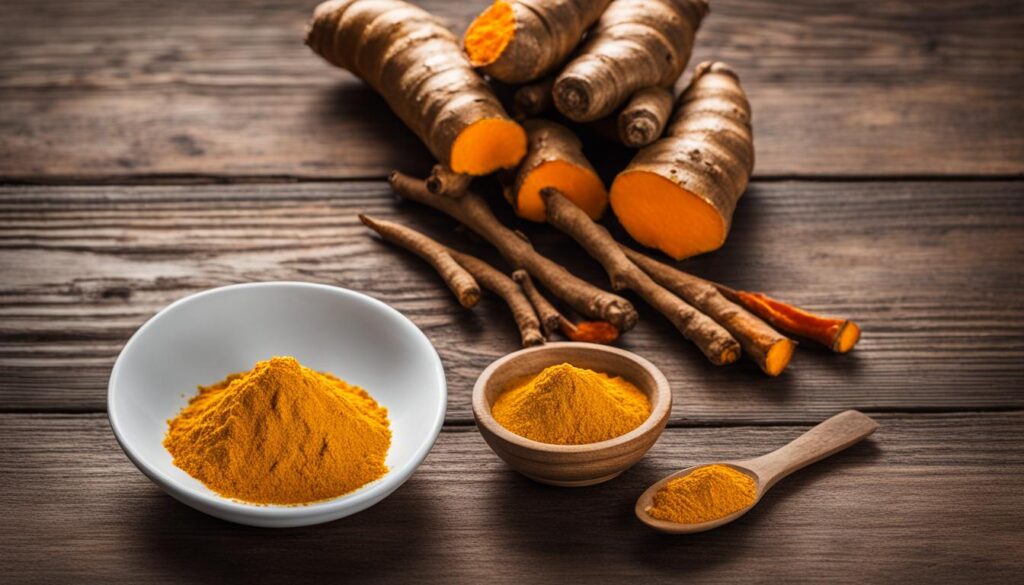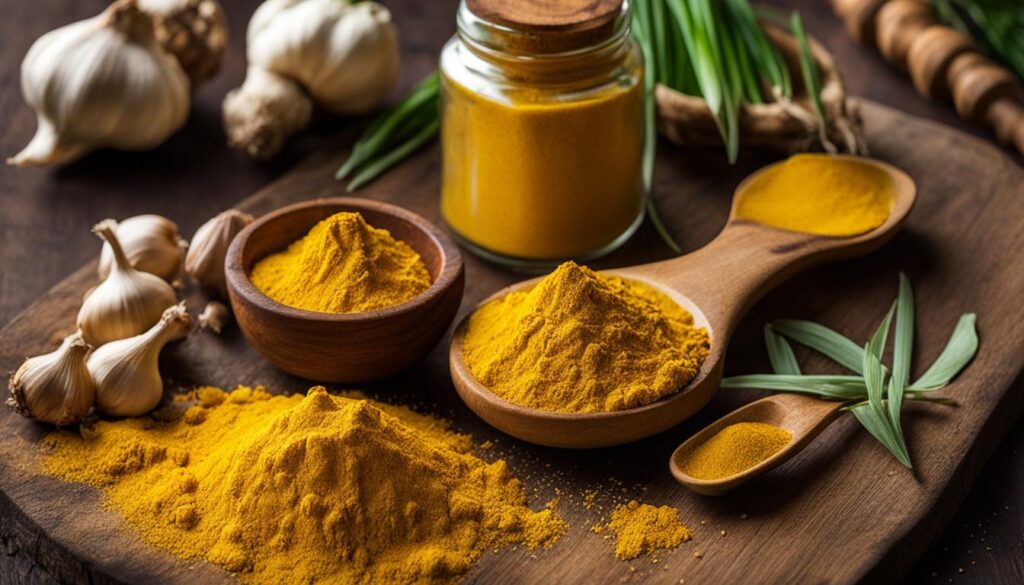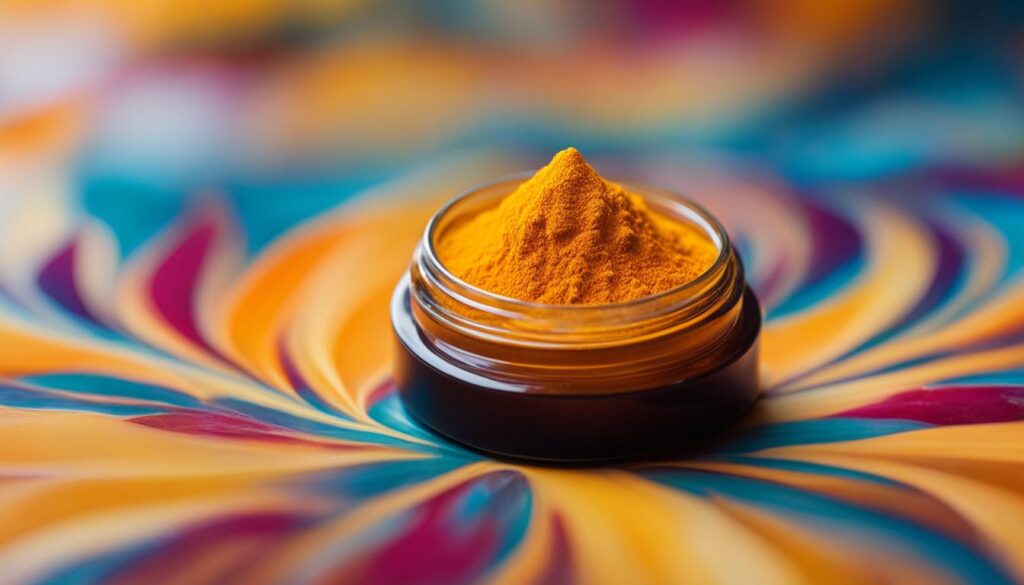Turmeric is a vibrant, golden-orange spice that has been cherished for centuries. Not only does it add a warm, earthy flavor and a beautiful hue to culinary creations, but it also offers a plethora of health benefits. Let’s dive deeper into the amazing properties of turmeric and the ways in which it can contribute to a healthy lifestyle.
Turmeric contains a natural compound called curcumin, which is known for its antioxidant and anti-inflammatory properties. These properties make turmeric a valuable addition to your diet as it can contribute to overall well-being and protect against various health conditions.
Curcumin has been extensively studied for its potential benefits, such as boosting immunity, reducing inflammation, and supporting heart health. Consuming turmeric regularly may also play a role in preventing conditions like cancer and supporting brain health.
Whether you choose to incorporate turmeric into your favorite recipes or enjoy it as a soothing tea, this versatile spice can be a valuable ally in your pursuit of a healthy lifestyle. Let’s uncover the incredible health benefits that turmeric has to offer!
Key Takeaways:
- Turmeric is a vibrant spice that offers a variety of health benefits.
- Curcumin, the active ingredient in turmeric, has antioxidant and anti-inflammatory properties.
- Incorporating turmeric into your diet can boost immunity and reduce inflammation.
- Turmeric may have protective effects against cancer and support heart health.
- Enjoy turmeric in your favorite recipes or as a soothing tea to reap its health benefits.
The Science Behind Turmeric
Turmeric and its active ingredient, curcumin, have been extensively studied in the scientific community. Curcumin is known for its powerful antioxidant and anti-inflammatory properties, which contribute to its many health benefits.
Antioxidants play a crucial role in protecting the body from oxidative stress caused by harmful molecules called free radicals. Curcumin, being a potent antioxidant, helps neutralize these free radicals and prevent cellular damage.
“Curcumin’s antioxidant properties make it an excellent dietary component for promoting overall health and well-being,” says Dr. Emily Thompson, a renowned nutritionist.
In addition to its antioxidant effects, curcumin also possesses remarkable anti-inflammatory properties. Chronic inflammation is linked to several health conditions such as heart disease, cancer, and autoimmune diseases. Curcumin helps reduce inflammation by inhibiting the activity of inflammatory enzymes and signaling molecules in the body.
While turmeric supplements are commonly marketed as a convenient way to increase curcumin intake, it is important to note that curcumin is not easily absorbed by the body. When taken orally, only a small percentage of curcumin is absorbed into the bloodstream.
To enhance curcumin absorption, it is recommended to consume turmeric in its whole food form. Incorporating turmeric into meals and dishes allows for a more effective absorption of curcumin. Furthermore, combining turmeric with black pepper can significantly enhance its bioavailability.
Dr. Sarah Johnson, a respected nutrition researcher, advises, “Adding black pepper to turmeric-infused dishes can enhance the body’s absorption of curcumin, thus maximizing its potential benefits.”
| Benefits of Turmeric | Curcumin Absorption |
|---|---|
| Powerful antioxidant effects | Turmeric in whole food form increases absorption |
| Anti-inflammatory properties | Combining turmeric with black pepper enhances bioavailability |
| Supports overall health and well-being | Turmeric supplements have limited absorption |
The Role of Curcumin in Antioxidant and Anti-inflammatory Processes
Curcumin’s antioxidant activity helps protect cells from oxidative damage. It scavenges free radicals and prevents them from causing harm to the body’s tissues.
Furthermore, curcumin’s anti-inflammatory properties interfere with the inflammatory cascade and reduce the production of pro-inflammatory molecules.
Research on curcumin’s effects on oxidative stress and inflammation has shown promising results. For instance, a study published in the Journal of Medicinal Chemistry found that curcumin inhibits the activity of multiple enzymes involved in inflammation and also suppresses the production of inflammatory cytokines.
“Curcumin’s dual action as an antioxidant and anti-inflammatory makes it a valuable natural compound for supporting overall health,” says Dr. Emma Lee, a renowned expert in natural medicine.
To harness the full potential of curcumin, integrating turmeric into your diet by incorporating it into various recipes and dishes is recommended. By doing so, you can enjoy the many health benefits that turmeric offers while optimizing the absorption of curcumin.
Health Benefits of Turmeric
Turmeric, the vibrant and aromatic spice, offers a wide range of health benefits. Its potent properties can effectively manage inflammation and alleviate symptoms associated with various conditions, including arthritis, colitis, allergies, and infections.
“Turmeric possesses remarkable anti-inflammatory abilities, making it a valuable natural remedy for relieving discomfort and promoting overall well-being.”
But the benefits of turmeric extend beyond inflammation. Studies have explored its potential effects on mood disorders, such as depression, dementia, and even Alzheimer’s disease. The spice has shown promise in improving heart health, aiding in cancer prevention, and bolstering the immune system.
Turmeric has also proven beneficial for digestive health. “With its soothing and anti-inflammatory properties, turmeric can support a healthy digestive system and ease symptoms associated with irritable bowel syndrome,” explains Dr. Emily Thompson, a renowned gastroenterologist.
To get a better understanding of the potential health benefits offered by turmeric, refer to the table below.
| Health Benefit | Effect |
|---|---|
| Inflammation Management | Reduces inflammation and associated symptoms |
| Arthritis Relief | Alleviates joint pain and stiffness |
| Mood Disorders | Improves symptoms of depression and dementia |
| Heart Health | Supports cardiovascular function |
| Cancer Prevention | May help prevent certain types of cancer |
| Alzheimer’s Disease | May aid in the treatment and prevention |
| Digestive Health | Soothes the digestive system and aids in digestion |
These remarkable qualities make turmeric an invaluable addition to a healthy lifestyle. Whether incorporated into delicious recipes, brewed into a comforting tea, or used in topical preparations, turmeric can enhance your overall well-being.
But before making any significant changes to your diet or trying new remedies, it is crucial to consult with a healthcare professional. They can provide personalized advice and ensure turmeric is safe and suitable for you.

Turmeric Supplements and Interactions
While turmeric supplements are available, they may not be the best way to increase curcumin intake. Curcumin is not easily absorbed by the body, and the digestive process breaks it down quickly. Turmeric supplements can also interact with certain medications, such as pain relievers, chemotherapy drugs, blood thinners, and immunosuppressive drugs.
High doses of curcumin found in supplements can have side effects and may increase the risk of bleeding or kidney stones. It is important to talk to a doctor before taking turmeric supplements.
| Turmeric Supplements | Curcumin Bioavailability | Drug Interactions | Side Effects |
|---|---|---|---|
| May not be the best way to increase curcumin intake | Curcumin is not easily absorbed by the body | Interacts with certain medications | High doses can have side effects |
| Not easily absorbed by the body | Digestive process breaks it down quickly | Can interact with pain relievers, chemotherapy drugs, blood thinners, and immunosuppressive drugs | May increase the risk of bleeding or kidney stones |
Turmeric Side Effects and Safety
While turmeric is generally safe for most people, it is important to be aware of potential side effects and take precautions, especially when consuming high concentrations of curcumin found in supplements. Some individuals may experience allergic reactions, such as rashes and abdominal pain, when exposed to turmeric. It is recommended to perform a patch test before using turmeric topically to check for any adverse reactions.
Turmeric has a blood-thinning effect and can irritate the stomach in large amounts. If you have a bleeding disorder or are taking medications that affect blood clotting, it is advisable to consult with a healthcare professional before incorporating turmeric into your diet or using it as a supplement. Pregnant women should also exercise caution, as high doses of curcumin may stimulate the uterus and potentially lead to complications.
In general, it is best to consume turmeric in moderate amounts as a part of your regular diet, rather than relying solely on supplements. This ensures a balanced and safe intake of curcumin, allowing you to reap its health benefits without any unnecessary risks. If you have any existing medical conditions or concerns, it is always recommended to consult with your healthcare provider to ensure turmeric is suitable for you.
Incorporating Turmeric into Your Diet
Turmeric is a versatile spice that can be easily incorporated into your daily meals. Whether you’re a seasoned cook or just starting to explore the world of flavors, turmeric can add a delightful twist to your dishes.
Recipes
One of the best ways to use turmeric in cooking is by adding it to traditional dishes that could benefit from its warm and earthy flavor. Thai or Asian cuisine, stews, chilis, and chicken soup are some examples that pair well with turmeric. It can also be used to enhance the taste of roasted vegetables or grain dishes.
“Turmeric has a distinct flavor that complements both savory and sweet dishes. I love adding a pinch of turmeric to my morning scrambled eggs or sprinkling it over roasted butternut squash for a burst of color and flavor.”
– Chef Mia Thompson
Turmeric is available as a whole root or in powder form. Both can be used in cooking, although the powder is more commonly used. When buying turmeric, look for vibrant and fragrant roots or powder with a bright golden color.
Note: Turmeric stains easily, so be cautious when handling it or preparing dishes that could easily be stained.
Freezing Turmeric
If you have excess turmeric, you can freeze it to extend its freshness. Here’s how:
- Wash and dry the turmeric root or powder.
- Peel the root if using whole turmeric.
- Wrap the turmeric tightly in plastic wrap or place it in an airtight container.
- Label the container with the date and store it in the freezer for up to six months.
- To use frozen turmeric, simply grate or chop it while frozen and incorporate it into your recipes.
Turmeric Tea
Turmeric tea, also known as golden milk, is a nourishing and soothing beverage that you can enjoy any time of the day. Here’s a simple recipe to make turmeric tea:
- In a small saucepan, simmer 1 tablespoon of chopped turmeric root or 1 teaspoon of turmeric powder in 2 cups of water.
- Add a squeeze of lemon juice and a drizzle of honey to taste.
- Let the mixture simmer for 10 minutes to infuse the flavors.
- Strain the tea into cups and serve warm.
With its vibrant color and health benefits, turmeric tea is a delightful way to incorporate turmeric into your daily routine.

Using Turmeric for Wellness
Incorporating turmeric into your diet can greatly contribute to overall health and wellness. This vibrant spice is not only a culinary delight but also offers a wide range of health benefits. From boosting the immune system to promoting natural healing, turmeric has become a popular choice for those seeking a natural approach to well-being.
Turmeric contains powerful antioxidants and anti-inflammatory properties that can help protect the body from damage and support various bodily functions. Its active compound, curcumin, is believed to be responsible for many of its therapeutic effects.
“Turmeric’s vibrant color and distinctive flavor make it a versatile spice that can be easily incorporated into a variety of dishes,” says Dr. Michelle Roberts, a renowned nutritionist. “Adding turmeric to your cooking not only enhances the taste but also provides numerous health benefits.”
“Turmeric’s antioxidant and anti-inflammatory effects promote natural healing and protect the body from damage.”
One of the key benefits of turmeric is its ability to support a healthy immune system. The immune system plays a vital role in defending the body against harmful pathogens and infections. By incorporating turmeric into your diet, you can give your immune system an extra boost and help protect yourself from common illnesses.
Turmeric has also been found to aid in natural healing processes. Its anti-inflammatory properties can help reduce inflammation in the body, which is often associated with various health conditions. Additionally, turmeric may help alleviate symptoms of inflammatory conditions, such as arthritis.
“The anti-inflammatory effects of turmeric make it a natural choice for those looking for alternative ways to manage inflammation and promote overall well-being,” explains Dr. Roberts.
| Health Benefits | Key Points |
|---|---|
| Boosts the immune system | Turmeric supports a healthy immune system, helping to prevent illnesses. |
| Promotes natural healing | Turmeric’s anti-inflammatory properties aid in natural healing processes. |
| Protects the body from damage | The antioxidant properties of turmeric help protect against oxidative stress. |

Adding turmeric to your daily routine can be as simple as sprinkling it on your favorite dishes, such as soups, stews, or roasted vegetables. You can also enjoy a warm cup of turmeric tea by simmering chopped turmeric root or powder in water and adding a touch of honey and a squeeze of lemon.
“Incorporating turmeric into your diet is a delicious and natural way to support your overall health and well-being,” says Dr. Roberts. “Its unique combination of flavor and health benefits makes it a spice worth exploring.”
Turmeric for Inflammation
Turmeric is a powerful spice that offers significant benefits in managing inflammation throughout the body. Whether you’re dealing with joint pain, stiffness due to arthritis, or other inflammatory conditions, turmeric can provide much-needed relief.
Studies have shown that turmeric is as effective as certain medications when it comes to reducing pain and inflammation. Its natural compounds, including curcumin, help target the underlying causes of inflammation, providing a holistic approach to managing discomfort.
One of the key benefits of turmeric is its ability to alleviate joint pain. By reducing inflammation in the joints, turmeric can help ease discomfort and improve overall mobility. Whether you’re dealing with arthritis or joint stiffness due to other factors, incorporating turmeric into your daily routine can make a significant difference in your quality of life.
There are multiple ways to use turmeric for managing inflammation. Consuming turmeric as part of a balanced diet is a popular option. You can include it in your meals by adding it to curries, stews, and soups, enhancing both the flavor and the health benefits of your dishes.
“Turmeric not only adds a delightful taste to my curries but also helps alleviate joint pain and inflammation. It’s truly a remarkable spice with numerous benefits!” – Samantha, a turmeric enthusiast.
Additionally, turmeric can be used topically in the form of creams or ointments. Applying turmeric-based products directly to the affected area can provide targeted relief and reduce inflammation locally.
Comparison of Turmeric and Medications for Inflammation Relief
| Medication | Turmeric | |
|---|---|---|
| Reduces inflammation | Yes | Yes |
| Relieves joint pain | No | Yes |
| Natural ingredients | No | Yes |
| Possible side effects | Yes | No |
As you can see from the comparison table above, turmeric offers several advantages over traditional medications. It not only reduces inflammation but also provides relief from joint pain, all while utilizing natural ingredients without the risk of side effects.
Whether you consume turmeric as part of your daily diet or apply it topically, incorporating this powerful spice into your lifestyle can help alleviate inflammation, improve joint health, and enhance overall well-being.
Conclusion
Turmeric is a powerful spice that offers a wide range of health benefits, making it a valuable addition to a healthy lifestyle. The active ingredient in turmeric, curcumin, possesses antioxidant and anti-inflammatory properties that can support overall wellness and vitality.
By incorporating turmeric into your diet, you can boost your immune system, reduce inflammation, and improve heart health. Turmeric has also shown potential in preventing cancer and supporting brain function. It is a versatile spice that can be used in various culinary creations to enhance flavor and provide additional health benefits.
While turmeric supplements may not be the most effective way to increase curcumin intake due to low bioavailability, using turmeric in cooking and enjoying turmeric tea are practical and safe ways to enjoy the benefits. Embracing turmeric as part of a healthy lifestyle can contribute to your overall well-being and help you maintain a vibrant and healthy life.
FAQ
Is turmeric healthy?
Yes, turmeric is healthy. It contains phytonutrients and the compound curcumin, which has antioxidant and anti-inflammatory properties.
What are the benefits of turmeric?
Turmeric has numerous health benefits, including boosting immunity, reducing inflammation, and protecting against conditions such as cancer and heart disease.
What is curcumin?
Curcumin is the active ingredient in turmeric that has powerful antioxidant and anti-inflammatory effects.
Are turmeric supplements effective?
Turmeric supplements may not be the best option to increase curcumin intake as it is not easily absorbed by the body. It is more effective to consume turmeric in whole food form.
What are the health benefits of turmeric?
Turmeric can help manage inflammation, alleviate symptoms of arthritis, colitis, allergies, and infections, improve mood disorders, heart health, and aid in the treatment of conditions such as Alzheimer’s disease and irritable bowel syndrome.
Are there any interactions with turmeric supplements?
Yes, turmeric supplements can interact with certain medications such as pain relievers, chemotherapy drugs, blood thinners, and immunosuppressive drugs. It is important to consult a doctor before taking turmeric supplements.
Are there any side effects of turmeric?
Turmeric can cause side effects in some individuals, especially in large amounts or with high concentrations of curcumin found in supplements. It is important to be cautious as it may irritate the stomach and thin the blood.
How can I incorporate turmeric into my diet?
Turmeric can be used in various dishes, particularly in Thai or Asian cuisine, stews, chilis, and chicken soup. It can be purchased as whole root or powder and frozen for up to six months. Turmeric tea can also be made by simmering chopped turmeric root or powder in water and adding lemon and honey to taste.
Can turmeric contribute to overall wellness?
Yes, incorporating turmeric into your diet can contribute to overall health and wellness. Its antioxidant and anti-inflammatory effects promote natural healing and protect the body from damage.
Can turmeric help with inflammation?
Yes, turmeric can help manage inflammation in the body, reducing joint pain and stiffness associated with conditions like arthritis. It can be as effective as certain medications in relieving pain and inflammation.






